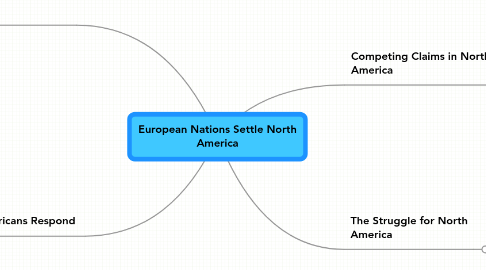
1. The English Arrive in North America
1.1. Colonists claimed the coast of Virginia and named the settlement Jamestown.
1.1.1. Jamestown became England's first permanent settlement in North America.
1.2. The central interest of searching for gold instead of planting crops, resulting in a high number of starvation, disease as well as battles with Native Americans
1.2.1. Outlook improved after farmers discovered tobacco, which was in high demand in England.
1.3. Pilgrims founded a second English colony in 1620 known as Plymouth, in Massachusetts.
1.3.1. Colonists sought religious freedom. Ten years later, a group known as Puritans also sought religious freedom and established a colony at nearby Massachusetts Bay.
1.3.1.1. The Puritans wanted to build a model community for other Christians to follow.
1.4. Following the English and French into North America were the Dutch, and claimed the region along the waterways the Hudson River, Hudson Bay, and Hudson Strait. They established trade with the Iroquois Indians.
1.4.1. Dutch merchants formed the Dutch West India Company, and the government granted the company permission to colonize the region and expand the fur trade. Dutch holdings became known as New Netherland.
1.5. During the 1600s, nations of Europe also colonized the Carribbean.
1.6. French seized present-day Haiti, Guadeloupe, and Martinique. English got Barbados and Jamaica. Dutch captured the Netherlands Antilles and Aruba from Spain.
1.6.1. On these islands, the Europeans built huge cotton and sugar plantations, enslaved Africans would later supply the labor for these products.
2. Native Americans Respond
2.1. French and Dutch developed a cooperative relationship with the Native Americans
2.1.1. This was due to mutual benefits of the fur trade. Native Americans did most of the trapping and then traded the furs to the French for such items as guns, hatchets, mirrors, and beads.
2.1.2. Dutch also cooperated with Native Americans in an effort to establish a fur-trading enterprise.
2.1.3. Dutch settlers fought with various Native American groups over land claims and trading rights, but the most part the French and Dutch colonists lived together peacefully with the North Americans.
2.2. Early relations between English settlers and the Native Americans were cooperative, but quickly worsened over issues of land and religion.
2.2.1. English sought to populate lands which meant they had to push the natives off the land.
2.2.2. Religious differences heightened tensions. English saw the natives as heathens and Native Americans developed a similarly harsh view on the Europeans.
2.3. Hostility between English and Native Americans led to warfare.
2.3.1. The Metacom led an attack on colonial villages throughout Massachusetts. In the months that followed, both sides massacred hundreds of victims. The colonists defeated the natives.
2.4. Europeans brought with them several diseases which devasted the native population in North America.
3. Competing Claims in North America
3.1. Explorers Establish New France
3.2. Samuel de Champlain founded Quebec, the base of France's colonial empire known as New France
3.3. By the early 1700s New France covered much of what is now the midwestern United States and eastern Canada.
3.4. France's North American empire was immense, but sparsely populated. They were more interested in making money off the land.
4. The Struggle for North America
4.1. The Duke of York claimed the colony for England and renamed it New York.
4.1.1. With the Dutch gone, English colonized the Atlantic coast of North America. In 1750, about 1.2 million English settlers lived in 13 colonies from Maine to Georgia.
4.2. English pushed farther west, and collided with France's North American holdings. As colonies expanded France and England began to interfere with each other.
4.2.1. In 1754 a dispute over land claims in the Ohio Valley led to a war between the British and French.
4.2.1.1. Conflict became known as the French and Indian War.
4.2.1.2. The war became part of a larger conflict known as the Seven Years' War.
4.2.1.3. Britain and France and their European colonists battled for supremacy in Europe, the West Indies, and India
4.2.1.3.1. North America, the British colonists, and the British Army defeated the French in 1763. French surrendered their North American holdings. British seized control of the eastern half of North America
